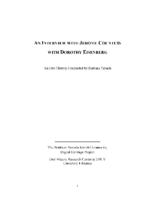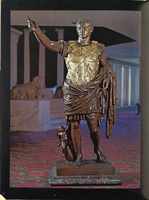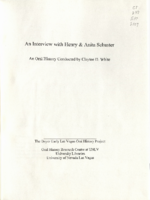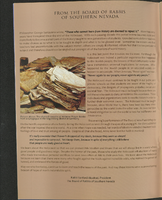Search the Special Collections and Archives Portal
Search Results

Transcript of interview with Maurice "Maury" Halfon Behar by Barbara Tabach, March 14, 2016
Date
Archival Collection
Description
In this interview, Behar reflects upon his childhood in France, and later adjusting to life in New York. He talks of his admiration for those that have cared for him in his youth, including Marie Cazous and his parents, Marco and Flora Behar. He details his career path, and how he ended up in Las Vegas. In addition, Behar describes a recent family trip to France, visiting his place of birth for the first time since leaving as a child.
Text

Transcript of interview with Michael S. Mack by Claytee White, May 21, 2009
Date
Archival Collection
Description
During this interview, Michael Mack visualizes his childhood memories of the later 1930s, when Las Vegas was a small, but steadily growing, desert town. As he says, "The desert was our backyard." The Strip hotels like the last Frontier and the Flamingo pop into the stories, but it was basically an innocent time. He attended John S. Park Elementary when classrooms were temporary buildings from the local Air Force base and the neighborhood was filled with children. He still maintains close friendships from that time. And he also recalls friends from the Westside neighborhood. Michael talks of scouting, riding horses, and watching Helldorado parades.
Michael Mack's first recollection of Las Vegas is as a two-year-old living in a duplex on Bonneville Ave. Though the family moved several times, they remained in or near the John S. Park neighborhood. Michael's father was a Polish immigrant who arrived in Boulder City, where he opened a shoe store, in 1932. The building of the Hoover Dam brought opportunities and his father Louis expanded into the salvage business. In time Louis moved the family to Las Vegas, opened a retail clothing store, which eventually sold uniforms, and set up the first local bail bondman office. During this interview, Michael visualizes his childhood memories of the later 1930s, when Las Vegas was a small, but steadily growing, desert town. As he says, "The desert was our backyard." The Strip hotels like the last Frontier and the Flamingo pop into the stories, but it was basically an innocent time. He attended John S. Park Elementary when classrooms were temporary buildings from the local Air Force base and the neighborhood was filled with children. He still maintains close friendships from that time. And he also recalls friends from the Westside neighborhood. Michael talks of scouting, riding horses, and watching Helldorado parades. Though the Macks were a Jewish family, Michael's mother always brought the Christmas tree to school. It was a period when people memorized each other's 3-digit phone numbers, went to movies for 14 cents, and there was a ranch for people to stay while getting divorced. Halloween Trick-or-treaters in the John S. Park neighborhood might get a tasty cupcake or a shiny dime. Michael has a plethora of stories about innocent mischief and the unique experiences of a boy growing up in Las Vegas.
Text

Transcript of interview with Jerome Countess and Dorothy Eisenberg by Barbara Tabach, October 28, 2014
Date
Archival Collection
Description
Interview with Jerry Countess and Dorothy Eisenberg by Barbara Tabach on October 28, 2014. Countess discusses his childhood and military life. He became involved in the United Jewish Appeal in Las Vegas and started the Jewish Reporter newspaper. Dorothy Eisenberg is also involved in the interview to discuss the Jewish Federation and the Jewish community.
Jerome Countess, known as Jerry to most, was born on December 22, 1920 in Brooklyn, New York. He grew up in the borough's Jewish neighborhood, and he developed a reputation for being a skillful handball player and a great dancer. Though he was not allowed to enlist in the U.S. Coast Guard due to colorblindness, Jerry was eventually drafted into the army during World War II. With very minimal combat training, Jerry was sent to North Africa as an infantryman, and was later stationed in Italy. After three years of service, Jerry returned home and married his childhood sweetheart, Rachel, in 1945. Using the G.I. Bill, he enrolled at New York University to study writing, though he quit just shy of graduation as his wife was expecting. After briefly working in the television broadcasting industry, Jerry landed a job with the United Jewish Appeal. In 1975, following in his desire to move west, Jerry took the job of executive director of the Combined Jewish Appeal in Las Vegas, what would soon be renamed the Jewish Federation of Las Vegas. Under his leadership, the federation started the Jewish Family Service as well as The Jewish Reporter, a monthly publication to promote engagement of the Jewish community. Jerry served as the executive director of the federation for many years, serving at the pleasure of many board members and presidents, including the first female federation president, Dorothy Eisenberg.
Text

Hotel room brochure from Caesars Palace, circa 1969
Date
Archival Collection
Description
Bound booklet with concierge information for Caesars Palace. The guide provides entertainment and dining information about the resort and casino, including room service menus and a telephone directory.
Text

Transcript of interview with Melody Stein by Barbara Tabach, August 16, 2016
Date
Archival Collection
Description
In this interview, Stein lovingly describes various forms and mediums of art, especially rubber stamping, which included starting and managing a related craft publication, National Stampagraphic, as well as working with polymer clay. She talks about her involvement with the local Polymer Clay Guild, of which she is president, and their various projects, including Bottles of Hope and Hearts for Heroes. Stein also discusses her teaching career at the Hebrew Academy and Adelson Educational Campus.
Text

Transcript of interview with Henry and Anita Schuster by Claytee White, March-April 2011
Date
Archival Collection
Description
In this oral history, the long married couple Henry and Anita Schuster recall the history of the 1930s and how they eventually met and created a life together. Their childhoods were distinctively different, but charter a future where they would inevitably meet. Born in Germany in 1926, Henry recalls the dawn of Hitler and the Nazism. His mother would arrange for his evacuation to France, where he would not know her fate or that of his two sisters for a number of years. Along with hundreds of other displaced children, he escaped to America and lived with relatives in Louisiana where he finished his schooling and joined the US Army. Anita on the other hand grew up with her family in New York. They share the story of meeting when she was 16, falling in love and marrying in 1948. They had four children and moved several times before settling in California. They retired to Las Vegas in 1993. Henry's recollections include childhood memories of the Holocaust and its affect on his family, including the loss of his mother and one of his sisters. Finding his surviving sister Bertel (Betty Kale) after the war is a heartwarming tale of survival. The Schusters are part of the approximately 300 members of the Holocaust Survivor Group that has settled in southern Nevada and Henry was President Emeritus of the group. He published his memoir, Abraham's Son-the Making of an American, in 2010.
Text

Program, The Memory Book accompanying The Diary of Anne Frank premiere performance, February 2009
Date
Archival Collection
Description
This program accompanied the performance of the Broadway adaptation of the Diary of Anne Frank by the Nevada Conservatory Theatre. The program was produced by the Jewish Family Service Agency. It includes biographies of survivors living in Southern Nevada and an educational guide.
Text

Preprint, Where I Stand: The Record of a Reckless Man, by Hank Greenspun with Alex Pelle, 1966
Date
Archival Collection
Description
Book proof with annotations from editors in the margins.
Text

Transcript of interview with Phyllis Friedman by Barbara Tabach, March 2, 2015
Date
Archival Collection
Description
In this interview, Phyllis Friedman reflects upon her extensive work with the ADL in Las Vegas. She discusses the city?s relatively low anti-Semitic activity, and how this allowed the Las Vegas ADL office to focus its efforts more broadly than in other cities. She also touches upon her family history, and how the community of Las Vegas has evolved since first visiting in 1963.
A Chicago native, Phyllis Friedman first came to Las Vegas in 1996 to become the Jewish Federation of Las Vegas? first foundation director. After two years, Friedman moved to year Los Angeles to work for ORT. Itching to get back to Las Vegas, in 2007, Friedman returned to the city to became director of the Nevada regional office of the Anti-Defamation League (ADL). In this position, she worked with schools as well as law enforcement, including the Federal Bureau of Investigation (FBI), teaching about tolerance and justice. She is a recipient of the FBI?s Las Vegas Division Director?s Community Leadership Award as well as the first awardee of Jewish Federation?s Jewish Professional of the Year. Three weeks into retirement, Friedman gave this interview, reflecting upon her extensive work with the ADL in Las Vegas. She discusses the city?s relatively low anti-Semitic activity, and how this allowed the Las Vegas ADL office to focus its efforts more broadly than in other cities. She also touches upon her family history, and how the community of Las Vegas has evolved since first visiting in 1963.
Text

Transcript of interview with Bobby Morris by Barbara Tabach, March 24, 2016
Date
Archival Collection
Description
In this interview, Morris reflects upon his career and the wide range of influential artists he has worked with, as a drummer, musical director and talent manager. Stories include playing with Louis Prima, live and on albums; serving as Elvis? musical director; filling in for Frank Sinatra?s drummer; entertaining Howard Hughes; and playing at President John F. Kennedy?s inauguration, to name a few. He also talks about his agency, attributing its success to the strong relationships he built with casino management.
Text
